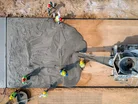Urbanisation ‘Driving Concrete and Cement Growth’

Increased urbanisation is driving significant growth in the construction industry, a new report says.
Technavio, the global research and advisory firm, says that this in turn will see the concrete and cement market expand by US438bn by 2028.
This growth, the report believes, is driven by factors including:
- Rapid urbanisation in the Asia-Pacific region
- Rising disposable incomes
- Adoption of AI technologies
- Increasing use of smart concrete
It says that this expansion is fuelling demand for staple building materials such as cement and concrete, as well as sustainable and innovative techniques that offer enhanced durability, sustainability and cost-efficiency.
The report draws on profiles on major companies in the construction sector, including: Adani Group, the multinational infrastructure conglomerate, manufacturing construction materials firm China National Building Material, and CRH, the construction material supplier.
Concrete and cement surge: urbanisation and infrastructure investments
The report highlights rapid urbanisation as a key driver of cement and concrete market growth.
It says this trend is particularly evident in the Asia-Pacific region, where cities are expanding rapidly, and also points out infrastructure investment – for building roads, bridges and homes – from both public and private sectors is also contributing to market expansion.
Technavio also notes that regulatory standards promoting sustainable construction and infrastructure resilience are shaping the industry's future.
These standards require the use of durable and environmentally friendly materials, further boosting demand for advanced concrete and cement products.
Technological advancements and market challenges with cement and concrete
The report also highlights digitalisation as a transformative force in the construction industry.
Digitalisation involves the use of digital technologies to improve processes and efficiency.
In construction, this includes the adoption of smart concrete and advanced manufacturing techniques.
Smart concrete is a type of concrete embedded with sensors that monitor its condition in real time.This enhances the durability and safety of structures by providing data on stress, temperature and other factors.
The report adds that such innovations are facilitating operational efficiencies and reducing costs.
However, it says, the market faces challenges – including rising construction costs and competition from alternative materials.
The production of cement is energy-intensive, and the industry is under pressure to reduce its carbon footprint.
The report authors suggest that companies are addressing these challenges by optimising manufacturing processes and investing in sustainable practices.
The report says: “The cement and concrete industry faces threats such as increasing raw material costs, energy prices, and regulatory requirements.
“However, opportunities exist in the form of technological advancements, such as the use of steel beams and precast concrete, and the expansion into developed markets.“
******
Make sure you check out the latest news at Construction Digital, a BizClik brand.
- Trackunit: the Future of Technology & AI for ConstructionTechnology & AI
- Tarmac Sustainability Report: Green Strides for ConstructionSustainability & Green Building
- Honeywell and Cisco Innovate HVAC for Building EfficiencyTechnology & AI
- PERI Brings Integrated Scaffold Solutions to ConstructionPlanning & Design




